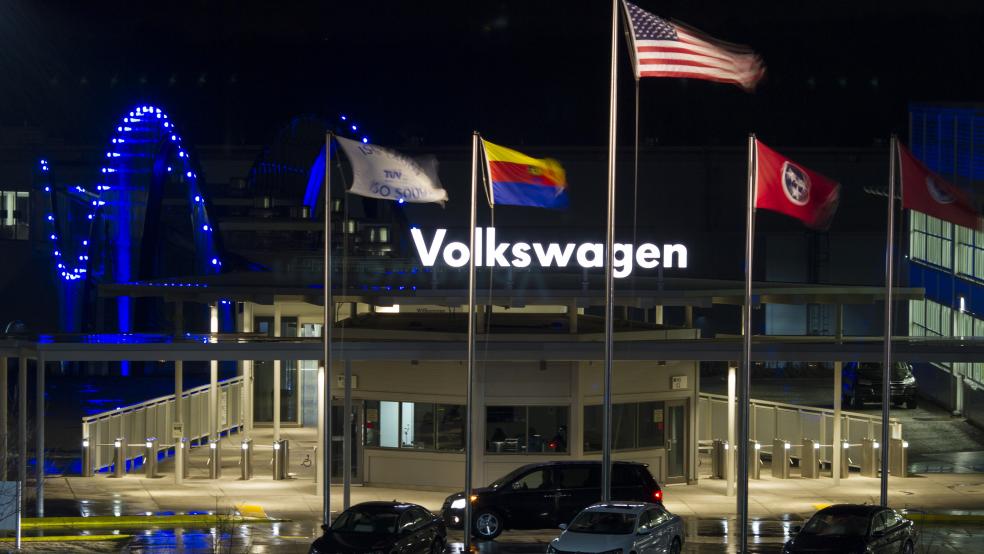When workers rejected organized labor in Chattanooga last week union officials were described as “stunned.” Shelve the shock. Why would workers at a VW plant in Tennessee have voted to join the UAW? They’re not crazy. They know that their very jobs – and the jobs of 100,000 others employed by automakers -- exist because Tennessee is a right to work state that has attracted manufacturers seeking refuge from organized labor.
They are hoping that Volkswagen will expand output in their state; becoming a UAW plant might have undermined that prospect. Workers know that in today’s fiercely competitive global economy, costly union wages and work rules might one day have put them out of business. Exhibit number one: Detroit.
Related: Organized Labor Gets No Vote at Volkswagen Plant
Still, considering the mammoth energy poured into the organizing effort at the VW facility, and a questionable assist from the National Labor Relations Board, the 54-46 percent slam-down of the UAW was not a given. Volkswagen was neutral on the drive and allowed organizers unfettered access, which was a major boost to the union, and the Obama administration has eased organizing rules so as to facilitate success.
At the end, workers were not convinced they would be better off carrying UAW cards. They would not have seen much increase in pay (they currently earn about $19.50 per hour, in line with newly hired UAW workers in Detroit), and it is unlikely that work rules would have changed much in their favor. The big selling point, and the reason that VW supposedly supported the union effort, was the prospect that a German-style “works council” would be established. So what?
Work councils are prevalent in Europe, and provide a forum for elected representatives of blue and white-collar workers to influence management decisions about work rules, schedules, hiring and the like. They are not involved with pay levels and they cannot call a strike. Consider them “union-light.” To a worker, they sound appealing; who doesn’t want a seat at the table?
There are no works councils operating today in the U.S., but suddenly many on the Left think they would be a dandy addition to our labor landscape. Color me skeptical, but the enthusiasm for a new form of worker representation appears an attempt at re-branding organized labor in order to stem its demise. (The UAW, for instance, has seen its membership shrink 75 percent over 35 years.)
Related: After Rejecting UAW, VW Workers May Still Get Work Council
Really, it’s rather clever. With unions losing ground fast and the public all too aware of the damage done by Big Labor (Exhibit two: Detroit), the UAW and its brethren need a new approach. If they can sell employees on the virtue of works councils, labor organizers can create a side door rationale for joining a union. That’s because advocates have pushed the notion that in order to host such a council, a company must first be unionized. That was the pitch in Chattanooga.
Enthusiasts cite evidence that works councils have contributed to Germany’s industrial success. A typical piece in The New York Times last fall said, “Managers in Germany see the councils as a way to head off labor problems and improve productivity.” (Notably, there hasn’t been as much coverage of works councils in Spain, for instance, where about 70 percent of workers are represented by councils and where productivity isn’t exactly soaring.)
The liberal blog ThinkProgress, in a recent piece titled “A New Idea to Empower Workers that Employers Actually Support,” says the councils “could not only give workers a foothold in power in an era of declining unionization, but they could also benefit employers themselves.” They cite an arcane study from the 1990s that describes potential benefits from improved communications between management and labor; but then they let the cat out of the bag by suggesting that “to bring a works council to a workplace in the U.S., workers would likely have to unionize as well.”
This refrain has been broadly repeated: no union, no works council, though the basis for this assumption is unclear. In a recent editorial, The Wall Street Journal notes, “Nothing in U.S. law explicitly prohibits workers from forming groups such as works councils….” Nonetheless, labor organizers are sticking to their guns, hoping that the allure of having a say in managing a factory will tip workers into the “sign me up category.”
Related: As Unions Lose More Members, Dems See Setbacks
In Chattanooga, it wasn’t enough. Americans’ view of Big Labor, though somewhat more positive than at the trough of the recession, has not recovered from the collapse of the Detroit automakers in 2009. When the government stepped in with $80 billion to bail out GM and Chrysler, Americans learned the inconvenient truth – that unions had rendered US manufacturers uncompetitive. We learned that GM was paying workers more than $70 per hour including benefits, compared to $48 at Toyota’s U.S. plants and the average private sector wage of $25.
The impact of the Detroit bailout was profound in part because the giveaways to the UAW at the time were shocking. Then, Detroit declared bankruptcy. It doesn’t take much imagination to lay the demise of that once-proud city at least partly at the door of the UAW. Folks in Chattanooga hope their city’s future is brighter, and today it is.
If employers are smart, they will encourage the kind of dialog and collaboration promised by worker councils, and figure out a way to get around any legal impediments. Such communication can only be positive. Management can learn a lot from workers, and vice versa. But, they don’t need stifling union work rules to make it happen. The VW workers in Chattanooga intelligently sent that message loud and clear.
Top Reads from The Fiscal Times:






